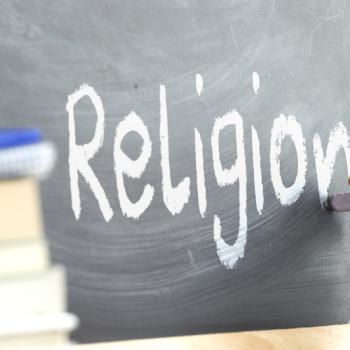Editor's Note: This is the second in a three-part series on theological reflections on the tragic shootings in Arizona. Last week: Christians and Guns. Next week: Christians and the Mentally Ill.
 My Grandma Irene and I could hardly be more different, culturally, politically, or religiously. She is a 91-year-old woman who has spent her life since age 17 in the Assemblies of God, speaking in tongues, reading the Bible literally verse by verse, and examining her soul nightly for secret sin that might damn her if Jesus returns in the Rapture while she sleeps.
My Grandma Irene and I could hardly be more different, culturally, politically, or religiously. She is a 91-year-old woman who has spent her life since age 17 in the Assemblies of God, speaking in tongues, reading the Bible literally verse by verse, and examining her soul nightly for secret sin that might damn her if Jesus returns in the Rapture while she sleeps.
She hasn't seen a movie since Shirley Temple was a box office star.
She believes Sarah Palin is a godly woman who deserves to be president.
And she once asked me if Episcopalians (which I am) believed in Jesus.
("No," I told her, because sometimes it's more fun to make her hit me than to tell her the truth. Honestly, you haven't lived until you've been chased around the house by a 91-year-old woman.)
We could hardly be more different, and yet, despite what I know are frustrations on both sides of our relationship, we don't screech imprecations at each other, we don't suggest that the other is damned for all eternity, and we don't encourage those in our respective camps to take the other out of the picture—any of the things that characterize the hate speech driving what TIME's Nancy Gibbs calls the "Mad as Hell" narrative at the heart of American life.
We don't do those things because we love each other.
Why, then, do Christians—liberal as well as conservative—so often demonize each other and pronounce themselves the only true heirs to Christ's legacy?
Why do we fail to love each other in the way that Jesus in the Gospel of John asked us?
On Wednesday, January 12, President Barack Obama spoke at a memorial for the Tucson dead and wounded, and his speech was a beacon of hope in the darkness. In its headline, The Guardian called his speech "a moment of calm amidst the toxic rhetoric." For that moment while the president was speaking, we were called to our best selves, reminded that we have much more in common than we think.
In that moment, our nation was encouraged to come together rather than to fall apart—or to tear itself apart.
There have been other such moments in our recent political life: Reagan after the Challenger disaster, Clinton at the Oklahoma City memorial service, George Bush after 9/11.
In each of those moments, we, as a nation, were called together to recognize our common life.
In each of those moments, presidents offered us what The Guardian called "discourse that heals not wounds."
And yet, so often, after the dust of drama and trauma settles, politicians and religious leaders (not to mention us) return to doing just the opposite. Wouldn't it be wonderful if all the public figures could model respectful disagreement as beautifully as Senator John McCain did in his Washington Post piece on Obama's speech?
I disagree with many of the president's policies, but I believe he is a patriot sincerely intent on using his time in office to advance our country's cause. I reject accusations that his policies and beliefs make him unworthy to lead America or opposed to its founding ideals. And I reject accusations that Americans who vigorously oppose his policies are less intelligent, compassionate or just than those who support them.
This week we're looking at hate speech, disagreement taken far beyond the calm opposition represented by Senator McCain, and again, we want to examine this from a theological standpoint, not a political one. In terms of so-called "rights" language, anyone in America has the right to say anything they want about anyone else so long as it's not demonstrably false and causes harm to their reputations. Franklin Graham, for example, could call me an ass in the service of Satan and all that would happen would be my feelings would get hurt; I could call Mr. Graham a rambunctious country bumpkin who reads the Bible with less understanding than my dog, and all that would happen is he and his cohorts would get huffy and say something equally ridiculous about me.





